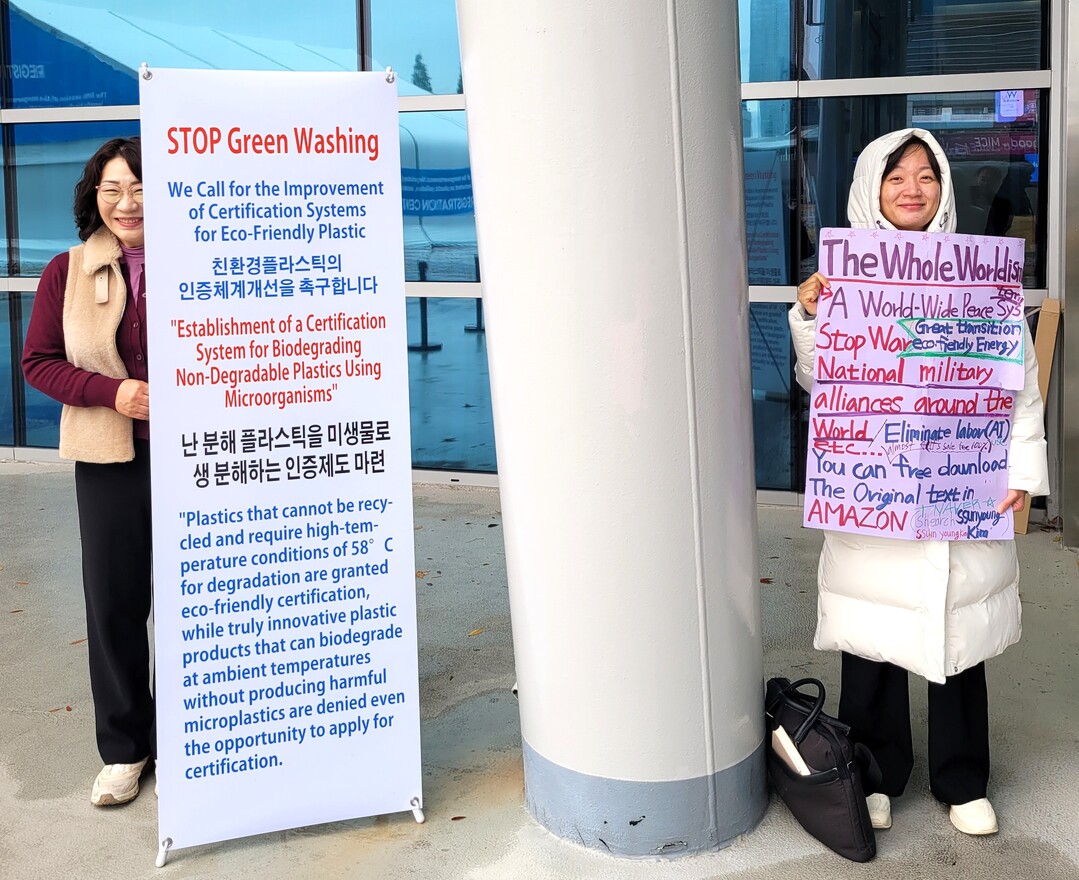국내 최초로 100% 미생물 첨가제 효소로 자연에 무해하고 미세풀라스틱 없이 생분해되는 기술력을 개발한 현재 정부 검증기관으로부터 과학적인 데이터 확보에 마무리 단계에 있다.
바로 (주)BADP코리아(대표이사 고신성)를 중심으로 플라스틱 생애주기 순환경제 위원회 회원들은 12월1일까지 부산 벡스코에서 열리고 있는 유엔 플라스틱 협약 성안 5차 정부간협상위원회 회의장 앞에서 국내외 정부, 기관, 기업, 시민사회에게 매우 난분해 플라스틱을 미생물로 생분해가 가능한 시대를 열게 될 것이라고 알렸다. 이들은 호소문을 전달하는 퍼포먼스를 펼쳤다. 아래는 공개한 호소문 전문이다.

"STOP Green-Washing Now"
친환경 플라스틱의 인증 체계 개선을 촉구합니다.
지구를 사랑하는 지구촌의 형제, 자매님 그리고 환경개선을 위해 불철주야 노력하시는 환경운동가, UN 및 정부관계자 여러분들에게 호소합니다. 플라스틱 재앙은 더 이상 피할 곳이 없습니다. 우리 아이들과, 함께 공존해야 할 지구촌 모든 동식물들을 위해 반드시 플라스틱을 친환경 소재로 변환시켜 가야 합니다.
그러나 생분해 플라스틱은 두 얼굴의 친환경 명분으로 미국, 중국, 일본, 한국 등 대부분의 국가는 아직도 'Green Washing'으로 불리는 고온의 '산업퇴비화(58±2℃)' 인증제품들에 머물러있고 유럽은 25℃의 가정퇴비화 인증을 보완하는 노력을 진행하고 있다. 여전히 산업퇴비화 정책이 우선시되고 있고 생분해 플라스틱은 일반 플라스틱의 재생을 방해하므로 별도 분리, 선별돼야하나 분리되지 못하고 처리되고 있습니다.

생분해 플라스틱은 불가능하다고 여겨졌던 석유화학플라스틱을 미세플라스틱을 남기지 않고 생분해 플라스틱으로 전환시키는 미생물 기반의 신기술들이 출현하고 있습니다.
그러나 인증체계를 선도하는 유럽의 인증기관들조차도 생분해 플라스틱 소재가 아니라는 이유와 적용할 인증기준이 없다는 이유로 플라스틱을 대체할 혁신적인 기술을 외면하고 있습니다. 우리는 플라스틱의 생애주기 순환경제의 실현을 위해 다음을 요청 드립니다.
♦석유화학 플라스틱을 생분해 인증제도 마련
재활용과 생분해를 동시에 충족하며 기존의 생분해 플라스틱 소재보다 환경오염을 효과적으로 개선할 수 있는 석유화학플라스틱의 생분해 제품에 대한 인증을 시급히 마련해 주십시오.
♦인증조건과 기간 대한 포괄적 제도보완
유럽의 생분해 인증조건은 산업퇴비화(58±2℃, 6개월), 가정퇴비화(25±5℃, 1년), 일반토양 생분해(25±2℃, 2년)로 기준이 분리되어 있으나 다양한 플라스틱의 생애주기를 담기에는 너무나 한정적이므로 매립조건 추가 등 인증조건과 기간에 대한 포괄적인 제도마련이 시급합니다.
혁신적인 생분해 소재들이 플라스틱 오염을 실질적으로 해결하고 완화해 인류의 생명까지 공격하는 플라스틱의 오염으로부터 하루빨리 해방되기를 간절히 기원합니다.
플라스틱 생애주기 순환경제 위원회 일동(biosolution@badpkorea.com, 02-3142-0883)

"STOP Green-Washing Now"
We Call for the Improvement of Certification Systems for Eco-Friendly Plastics
To our global brothers and sisters who love the Earth, to environmental activists tirelessly working for a better future, and to officials in the UN and governments worldwide. We earnestly appeal to you. The plastic crisis has reached a point where there is no escape. For the sake of our children and all living organisms with whom we share this planet, we must urgently transform plastics into genuinely eco-friendly materials.
However, biodegradable plastics are often falsely branded as eco-friendly under the guise of "Green-Washing" Most countries, including the United States, China, Japan, and South Korea, still rely on "industrial composting" standards, requiring high temperatures of 58±2℃ for certification. While Europe has taken steps to introduce home composting certifications at 25℃, industrial composting remains the dominant framework. Additionally, biodegradable plastics disrupt traditional plastic recycling processes, necessitating separate collection and sorting. Unfortunately, such separation is rarely carried out effectively.
Emerging microbial technologies now enable the transformation of petroleum-based plastics into biodegradable plastics without leaving microplastic residue—once considered impossible. However, even leading certification bodies in Europe continue to overlook these groundbreaking innovations, citing the absence of relevant standards or arguing that such materials do not fit existing categories for biodegradable plastics.
For a true circular economy in the lifecycle of plastics, we urgently request the following:
Establishment of Certification Standards for Biodegradable Petroleum-Based Plastics
Develop certification systems for biodegradable petroleum-based plastics that meet both recycling and biodegradation criteria. These materials can address environmental pollution more effectively than current biodegradable plastics.2.
Comprehensive Revision of Certification Conditions and Timeframes
The current European certification standards for biodegradation are segmented into industrial composting (58±2℃, 6 months), home composting (25±5℃, 1 year), and natural soil biodegradation (25±2℃, 2 years). However, these standards are far too restrictive to address the diverse lifecycles of plastics. We urgently call for more inclusive certification systems that take into account additional conditions, such as landfill environments, and allow for broader criteria and flexible timeframes.
We earnestly hope that innovative biodegradable materials will effectively address and mitigate plastic pollution, ultimately freeing humanity from the harmful impacts of plastic contamination, which now threatens even the very essence of life.
On behalf of the Plastics Lifecycle Circular Economy Committee



